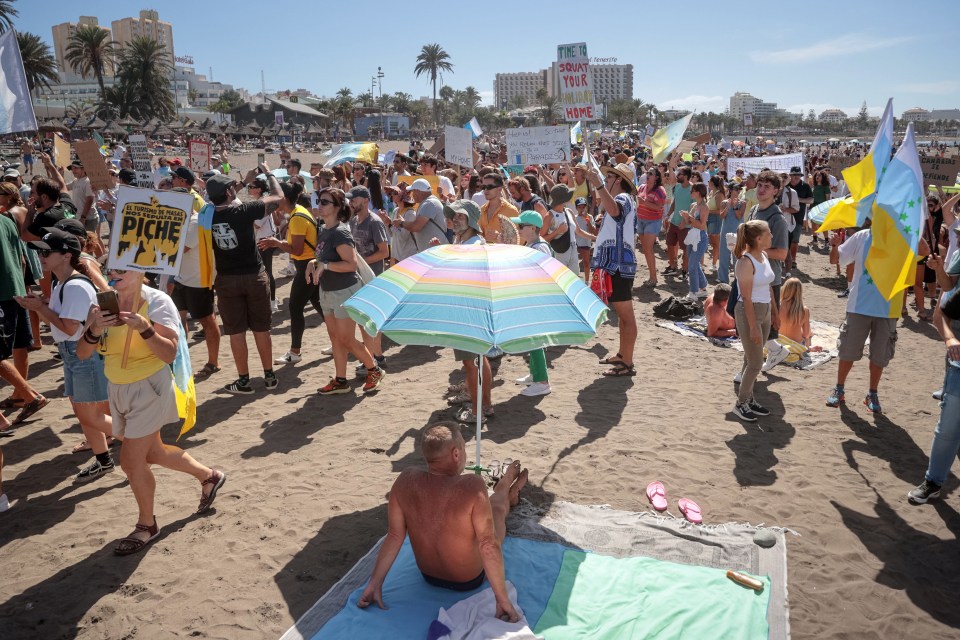BRITS heading to the sun-soaked Canary Islands this summer are in for a shock with furious locals plotting mass protests and the government ripping up its tourism rulebook.
Holiday hotspots like Tenerife are bracing for a summer of unrest as residents rise up against what they claim is a “predatory model” of tourism that’s pushed locals to the brink.
AFPProtesters march on Las Americas beach during a demonstration to protest against mass tourism in Tenerife[/caption]
AlamyDemonstrations have been boiling up across Spain[/caption]
EPAPeople protesting against tourists in the Canary Islands[/caption]
Activists have vowed to storm popular tourist attractions, disrupt public events and “confront political leaders” in a fiery new phase of protests kicking off May 18 — right as peak holiday season begins.
“From now on, we will take our fight to the very spaces where their predatory model is perpetuated,” declared pressure group Canarias tiene un límite (The Canaries Have a Limit).
“We will boycott public events, confront political leaders during their appearances and occupy symbolic tourist spaces to make it clear that we will not stop until real change is achieved.”
The movement — now spreading beyond Tenerife — insists it’s no longer business as usual for tourism in the region.
“The Canary Islands can no longer be a postcard backdrop for the enjoyment of a privileged few,” the statement read.
In a separate warning, the group said: “This cry, which reflects the feelings of a people tired of being ignored and mistreated, will be the beginning of a new stage of struggle: firmer, more direct, more uncomfortable for those who refuse to listen to us and take real measures.”
The backlash follows a 170,000-strong hotel and restaurant workers’ strike across the islands just days ago, with locals slamming low wages and poor working conditions in the booming holiday industry.
In June last year, beach workers also walked off the job over what unions called “precarious” conditions.
As tensions boil over, the Canary Islands Government has now announced plans to completely overhaul its outdated 30-year-old tourism laws in a landmark reform effort.
Alfonso Cabello, spokesperson for the regional government, said: “We’re doing this the Canary Islands way — extending a hand and listening to everyone.”
The sweeping reforms aim to tackle everything from sky-high housing costs in tourist areas to crumbling infrastructure and overworked public services.
Jessica de León, the Canary Islands’ Minister of Tourism and Employment, stressed the need to protect residents’ quality of life.
“The new regulation must align with today’s social and environmental realities, correcting outdated elements and integrating changes from national and regional rulings, including Constitutional Court decisions,” she said.
She also confirmed that changes would include defining tourism-heavy municipalities to prioritise infrastructure upgrades where they’re most needed.
The new legal framework is expected to roll out over the coming months.
It will also set tougher planning and building standards, tighten rules on holiday rentals, and introduce the first regulation for campsites and outdoor tourism.
Despite the chaos, unions have urged tourists not to cancel their holidays, insisting their anger is aimed at the system, not the sunseekers.
GettyThousands of people demonstrate against tourism policies on the island of Tenerife in April 2024[/caption]
GettyTourism policy in the Canary Islands has left little room for the local population, the protesters argue[/caption]
But protests are set to escalate fast.
On April 5, anti-tourism protests exploded across Spain, with furious demonstrators flooding over 40 cities — from Barcelona to Madrid — in one of the largest uprisings yet.
Some activists even urged locals to superglue the locks of holiday rentals to keep them out of use.
Protests followed on from a series of demonstrations last summer.
Canary island beach workers also went on strike in June over precarious working conditions.
Unions said they wanted to alert holidaymakers to the possible effects of the strike but asked them not to cancel their plans.
They also said they didn’t want tourists to change their image of the Canaries as a good holiday destination.
In March, campaigners issued a chilling open letter to foreign visitors, telling them: “ENOUGH! STAY HOME! We do not need more tourists; in fact, you are the source of our problem. DO NOT COME.”
GettyMillions of tourists, including many Brits, flock to Tenerife and other hotspots in the Canary Islands every summer[/caption]
Anti-tourist measures sweeping hotspots
MAJORCA and Menorca are just some of the European hotspots implementing anti-tourist measures.
Many top holiday destinations across the continent are taking action to prevent unwanted travellers from taking over their towns and cities.
Locals feel they can no longer live in the iconic destinations because they have become overcrowded, unsafe and uncomfortable.
They say there are too many cars on the roads, traffic congestion, overcrowded beaches, blocked access roads, ruined beauty spots and just too many holidaymakers flocking to the island which expects record figures this summer.
Last April, thousands of people took to the streets in Tenerife to demand restrictions on holidaymakers after telling Brits to “go home”.
The anti-tourist hordes filled a square in the capital brandishing banners including some that read “You enjoy we suffer” in English.
Protests also took place at the same time on other popular Canary islands including Lanzarote and Gran Canaria.
The marches were organised under the slogan “The Canary Islands have a limit.”
Hotel bosses in Benidorm have even admitted they are “very worried” by the anger growing amongst island residents but branded holiday homes in Spain a “virus”.
More recently, the Committee on Tourism, Trade, Employment, Culture and Sport reportedly approved an initiative to reintroduce a cap on cruise ships to Palma, Majorca’s capital.
Politicians are keen to implement a new set of rules on cruise ships in terms of taxation, the environment or the use of less polluting fuels to lower numbers coming into the Balearics.

